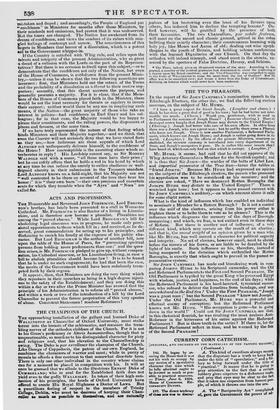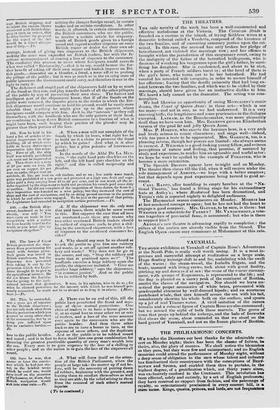CURRENT CORN CATECHISM. .
[ORIGINAL, AND FOUNDED ON THE MATERIALS OF THE PASSING SIOMENT.)
(Continued.)
186. He began by as- suring the House that it was not his wish to occupy by any motion of a spxulative character that time which he fully admitted ought to be devoted as much as pos- sible to practical measures. — Times, June 6, 1834. House of Commons. Rx- CIPAOCITY DUTIES.
187. The direct tendency of those sets was to (ham- A. This kind of exordium always meant, that the disputant has a truth to keep back under the title of "speculative," and a fal- lacy to bring forward under the title Of practical." It means that he is going to pray attention to the fact that a certain robbery gives sixpence to a dishonest trade, and pray that eyes may be shut to the fact that it takes two sixpences from honest peo- ple, of which it throws one into the sea.
A. The " Reciprocity Act" complained of, gave the Government the power of ad- for the repeal of the Act would be a direct uline,a- rage British shipping, and mitting thc cheaper foreign vessel, in certain to injure the various classes trades and on certain conditions. In other connected with British ship- words, it allowed, in certain circumstances, ping to such an extebt, that. the British consumers, who are the public, to delay further the pi opt Isar to receive a certain article for sixpenny-
worth of British goods given to a foreign
tion of d uty.— 1 b. vessel and expend another sixpence on some
British trader or dealer for their own ad- vantage, instead of giving two sixpences to the British shipowner, making the same sum expended on British traders, but with the fa- cetious accompanimitit of causing a loss of sixpence to the consumer. The confining this process to cases where foreigners would concede 'bat was called " Reciprocity,"—that is to say, would bestow the fur- ther benefit of taking off their own unjust and foolish imposts on Bri- tish goods,—depended on a blunder, a fraud, a mere efft.rt to prolong the pillage of the public ; but it was as much as in the erCsting state of public ignorance the Government could carry, mid therefore it was in the right to carry it.
The dishonest and stupid part of the shipowners hold on by as much of the fraud as they can, and play into the hands of all the other pillagers of the public by way of preserving their own share. The honest and intelligent part of the shipowners know, that if all the frauds on the public were removed, the impulse given to the trades in which the Bri- tish shipowner would continue to hold his ground, would he vastly more valuable than anything he might give up in the quarters where foreigners could compete with him. As it is, the "interests" as they call themselves, with the landlords who are the only gainers at their bead, are combining to keep down British commerce to a fraction of what it might have been, each hoping their portion of the plunder may be greater than their portion of the loss.
188- Now he held in his band a list of articles of es- sential importance in ship- building, all of which were liable to heavy duties upon importation into this coun- try. First of all, the ship itself was wholly prohibited —it must not be imported at all. Then there was a dray of 20 per cent on iron, 30 per cent on copper, 50 per cent on casks, 30 per cent on A. When a man will not complain of the frauds by which be loses, what right has he to build on it a claim to preserve the fraud by which he gains ? And what is it alto- gether, but a plica polunica of interwoven frauds ?
In the words of the Aldo? DE La MEN- NAT% " the right hand puts shackles on the left, and the left hand puts shackles on the right," and this is called reciprocity and freedom.
saikloth, 21. 15s. per load on oak timber, and so on ; live cattle irere taxed, grain was prohibited at a low price and protected at a high one, fruit and vege-
tables paid a duty varying from 40 to 50 per cent, and in one word, all the al- ticks required by the shipowner to build and provision his vessels paid sonic duty or another. He did not complain of the imposition of those duties, far from it ; their imposition was founded on a wise policy, but they increased the cost of ' ships and the cost of navigation, and by so doing proved onerous to the pursuit in which he and others were engaged. To be just in the pursuit of that policy, the Legislature bad extended to navigation certain protections. --lb.
189. —the British ship- owner, burdened as he was already, was told " You must carry on trade in free competition with a nation the least heavily taxed in die world, or you must give up navigation altogether." A. If the shipowner was the only man that paid taxes, there might be some sense in this. But suppose the case that all men are overtaxed ;—is there any reason why two other overtaxed British traders should be robbed of sixpence each, to give a shil- hug to the overtaxed shipowner, with a loss of sixpence to the overtaxed consumer be- sides?
A. Why should any man be so absurd as to ask the public to give him one robbery and waste, as a set-off against another rob- bery and waste? Why does not he go to the source, and say, "Stop the robbery and waste that is practised upon me?" The landlords exercise a huge robbery upon the public, the shipowner included. " Give me another huge robbery," says the shipowner, "in common justice." And so the public is to be robbed by both.
191. This, he contended, was a gross act of injustice to the British shipowner; you not only took away from Lim the protection which you granted to every other class of the community, but by KO doing you inflicted upon Lim an exclusive burden. lb.
192. Sure he was, that sooner or later the convic- tion which he had just sla- ted, in the briefest terms Which he could use, would foree itself on the attention of Parliament., or, if not, that British navigation would sink into utter ruin.—lb. A. What will force itself on the atten- tion of the British Parliament, when the people at large take the matter up if not be- fore, will be the necessity of putting down all robbers, beginning with the greatest, and leaving thein to comfort themselves as well as they are able, by the relief arising to them from the removal of each other's mutual injuries
(To be continned.)























 Previous page
Previous page